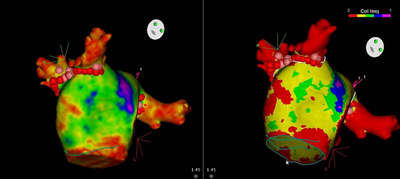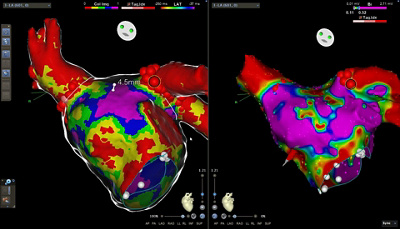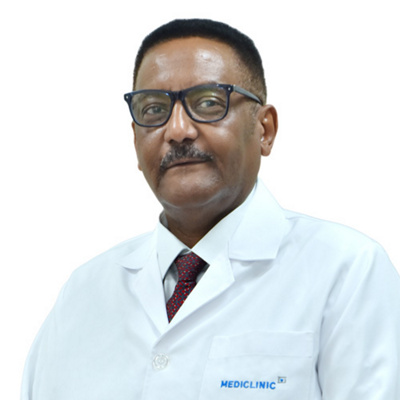Electrophysiology is a branch of cardiology which helps doctors to evaluate the heart’s electrical activity, understand, locate and treat the abnormal heart rhythms. Cardiac electrophysiologists are cardiologists who specialise in diagnosis and treatment disturbances of the heart´s electrical system. They evaluate arrhythmias (abnormal heart rhythms) to help determine the right treatment for you. They will oversee all aspects of your care, from diagnosis to treatment to follow-up care.
In the Heart and Vascular Centre at Mediclinic City Hospital, we often use an electrophysiology study to evaluate patients who have experienced an abnormally rapid or slow heart rhythm. We also recommend this for patients who have impaired heart function and intermittent extra heartbeats. In some situations, our patients with a congenital cardiac condition may need an electrophysiology study in order to assess their risk of developing arrhythmias.
Electrophysiology Study
A doctor threads thin, flexible tubes (catheters) tipped with electrodes through the blood vessels to different areas within the heart. Once in place, the electrodes can map the spread of electrical impulses through the heart. Doing this helps the doctor determine the location of the arrhythmia, its possible causes and the best treatment options including ablation therapy.This test may also be done to determine if a person with certain health conditions is at risk of developing heart arrhythmias.
Ablation Therapy
During ablation therapy, a small wire is passed through a leg blood vessel up to the heart, and focal areas of the heart are ablated with either heat (radiofrequency energy) or freezing cold to create scar tissue and isolate abnormal electrical signals. Ablation therapy is the only treatment that offers a potential cure for these arrhythmias. No incisions are made and the patient will often go home within 24 hours.
Outstanding Treatment for Arrhythmias
Based on electrophysiology study results, our consultant electrophysiologist decides on the treatment, medication, catheter ablation, implantation of a pacemaker or defibrillator to manage the heart’s rhythms, or more diagnostic tests.
In conjunction with a diverse, multidisciplinary team of other cardiac specialists, our electrophysiologists perform electrophysiologic studies and use advanced 3D mapping and imaging systems to diagnose and treat a wide variety of heart rhythm disorders. Our staff is actively developing new technologies to treat heart rhythm disorders.
3D Navigation System to Treat Arrhythmias at Mediclinic City Hospital


At Mediclinic City Hospital, we are committed to providing world-class care for all types of heart rhythm conditions, which goes well beyond diagnosis and treatment. To help meet any needs that may arise, we offer a comprehensive range of support services to patients throughout their care journey to recovery.
The following are some of the services which are provided in the Electrophysiology clinic:
- Outpatient and inpatient consultation service
- Invasive and non-invasive investigations for heart rhythm disorders other than electrocardiography, such as Holter monitoring (portable device) and extended cardiac rhythm monitors
- Invasive electrophysiological procedures when required to diagnose arrhythmias and conduction disturbances and catheter ablation of these arrhythmias when appropriate
- Assessment of patients with loss of consciousness syncope (fainting) to exclude life threatening arrhythmias and genetic syndromes
- Assessment and management of patients who require implanted cardiac rhythm devices
- Diagnosis and management of arrhythmias, undiagnosed heart palpitations, tachycardias and bradycardias
- Ablation of all types of supraventricular and ventricular arrhythmias (atrial and ventricular tachycardias, atrial fibrillation, atrial flutter, atrial and ventricular extrasystoles) with 3D navigation system
- Diagnosis and management of hereditary arrhythmic syndromes
- Implantation and follow-up of cardiac devices such as pacemakers and defibrillators, cardiac resynchronisation therapy, Implantable Loop Recorder.
- Tilt table test and cardioversion
Cardiac Arrhythmias
Patient Education
HEART ARRHYTHMIAS
Any alteration in the usual electrical pathways in your heart can cause an abnormality in your heart rhythm. This is called an arrhythmia.
Supraventricular Arrhythmias
Abnormal heart rhythms that begin in the upper chambers (atriums) of the heart are usually rapid. People who experience supraventricular arrhythmias may feel dizzy or light-headed, or have chest tightness or palpitations. Some people do not have any symptoms at all.
Supraventricular arrhythmias can last for only a few seconds or for prolonged periods of time. They are usually not life threatening. However, they can disrupt the regular flow of blood throughout your body and cause you to feel unwell or have other, more serious, symptoms.
Atrial Fibrillation
Atrial fibrillation is an irregular heart rhythm that occurs in the atrium and some veins that arrive to the heart. Instead, the atria start to trigger rapid and disorganised electrical signals, causing the atria to quiver rather than contract normally. These abnormal impulses randomly pass through to the ventricles, resulting in an irregular and inefficient heartbeat.
Atrial fibrillation is the most common arrhythmia affecting millions of patients. This is also expected to increase as our population ages. While many patients may have minimal or non-symptoms, it can be a debilitating condition, causing varying symptoms such as palpitations, dizziness and fatigue. Atrial Fibrillation, despite severity of symptoms, can also increase the risk of stroke.
Atrial Flutter
Atrial flutter is similar to atrial fibrillation but less common. In atrial flutter, the electrical impulse that starts in your atria gets disrupted, interrupting its normal flow to the ventricle. This creates a circular feedback loop and sets off a series of rapid-fire impulses, causing your heart to beat quite fast for periods of time. Patients with atrial flutter often can also have atrial fibrillation.
Paroxysmal Supraventricular Tachycardia
Tachycardia is a rapid heart rhythm that occurs when there is a disruption in the normal electrical pathways. There are various types of supraventricular tachycardias.
AV Node Re-entrant Tachycardia: AV node re-entrant tachycardia occurs when the electrical impulse gets caught up in extra fibres around the atrioventricular node and starts to rapidly circle. This causes a rapid heart rate.
AV Re-entrant Tachycardia (AVRT)/Wolff-Parkinson-White (WPW) Syndrome: The patients have an extra electrical pathway in their heart that connects the atria and the ventricles. When the electrical impulse goes through the extra pathway, it can cause periods of very rapid heartbeats.
Atrial Tachycardia: With atrial tachycardia, the rapid electrical impulse starts somewhere in the atria. This causes an abnormally rapid heart rate.
Ventricular Arrhythmias
Ventricular arrhythmias occur in the lower part of the heart (ventricles) and can be a bit more dangerous. During ventricular tachycardia, the heart beats so fast that it cannot properly pump blood to the rest of the body. This can cause dizziness, fainting or sometimes a collapse.



